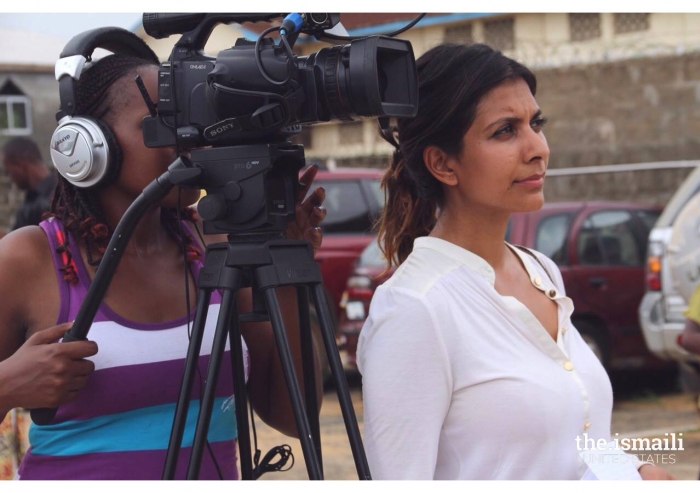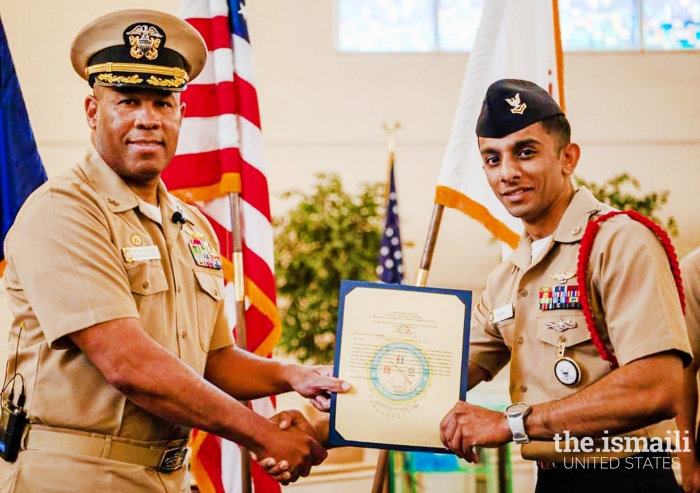From a whispering wind to a chirping cricket, a honking car to the “lub-dub” of our heart, music is ever-present. It conducts itself through and around us. Every aspect of life can be seen as a musical note of some kind: high, low, sharp, flat, natural, slow, on-key, major, or a minor. For Ismaili Muslims around the world, July 11, 2017, was undoubtedly one of the most anticipated and climactic points in the ongoing symphony of our history.
In the months preceding the celebration, volunteers worked tirelessly to hone a craft that one volunteer said is “the most vulnerable” part of themselves—their voices, and musical talent. The hard work was well warranted, however, as the Northeastern USA Jamat began and ended their Diamond Jubilee celebration with the magic and unifying power of music.
As the Jamat entered the Philadelphia Expo Center, they were greeted with a sea of multicolored bandhini performances by Golden Club Matki bands from around the region that sang traditional Indo-Pak tunes and played instruments from that region. “Being able to greet the Jamat as they walked in reminds me of my days as a youth volunteer at the Platinum Jubilee of [Imam] Sultan Mahomed Shah,” said one of the Golden Club members from New York Headquarters Jamatkhana, and “I never thought I would get the opportunity to serve in this capacity again. I am blessed again today.”
Youth members from the region then followed Golden Club Matki Band with a Western rendition of the same devotional score.
As the day went on, the Jamat prepared for the One Jamat Launch, which featured a marching band parade, songs, and choreographed dance. One Jamati member described the multilingual composition put together by Samira Noorali, Kamal Haji, and Aamir Barolia as “breathtaking.” And rightfully so. The composition was special because it encompassed the Western and diverse Eastern traditions within the Ismaili community.
The song included lyrics in English, Farsi, Arabic, and Urdu, and included classical Indo-Pak musical elements, along with the dramatic inclusions of string and wind instruments. Even trained musicians would be hard-pressed to find a composition piece that is so diverse.
In working with the performers in the weeks leading up to the performance, the beauty and complexity of each tradition included in the piece became more apparent. The choreography for the event made the appreciation for the diverse styles of music in the show that much greater.
After the moving performances, the Jamat proceeded to the Intezaari program where another multicultural composition was put on display (via video feed) during the Homage Ceremony. Each region where the Jamat currently has a presence was represented in the piece. While watching, many members of the Jamat were unable to contain their tears as they were reminded, among other things, that deep spiritual ties keep our community together even though we may not know one another personally.
After the telecast, the Jamat performed the One Jamat Dance together, then continued dancing during the night to the sounds of the Northeast Central Asian Band, and played raas and garba to the geets performed by the Northeast Orchestra.
One Indian mother noted that one of the most touching moments she experienced on July 11 was her daughter learning how to move her hands to emulate a bird, a common element in Pamiri pantomime dance, from a Tajiki child who was younger than her daughter. She noted that this was a “living example” of the pluralism and “global citizenship” that Mawlana Hazar Imam often promotes.
Between each of the events, the Jamat was treated with teasers of new tracks composed by Jamati members around the nation compiled within the new CDs released to celebrate the Jubilee of our beloved Imam—titled Journey of One Jamat, Diamonds in the Sky, Treasure of Diamonds (Khushiyon Ka Khazana), Reflections, and Shukran. By the end of the night, many of the members of the Jamat could be heard humming “Diamond Hai Diamond” along with Fez Meghani and Aftab Ali (Diamonds in the Sky).
Locally, regionally, nationally, and internationally, the power and constant growth of our Jamat comes from our diversity, and our ability to celebrate it. Often when our happiness and gratitude cannot be strung into eloquent phrases or articulated in a common language, it can be expressed, sometimes more powerfully, through music. The music interwoven within the activities, performances, and services of the Opening Ceremony allowed for us to experience unity and celebrate our happiness in a divinely unique manner, one that requires no understanding of language, age, race, or gender because it is all around us, and is common to us all—a manner that our forefathers have laced so purposefully into our tradition and history as Ismaili Muslims.










